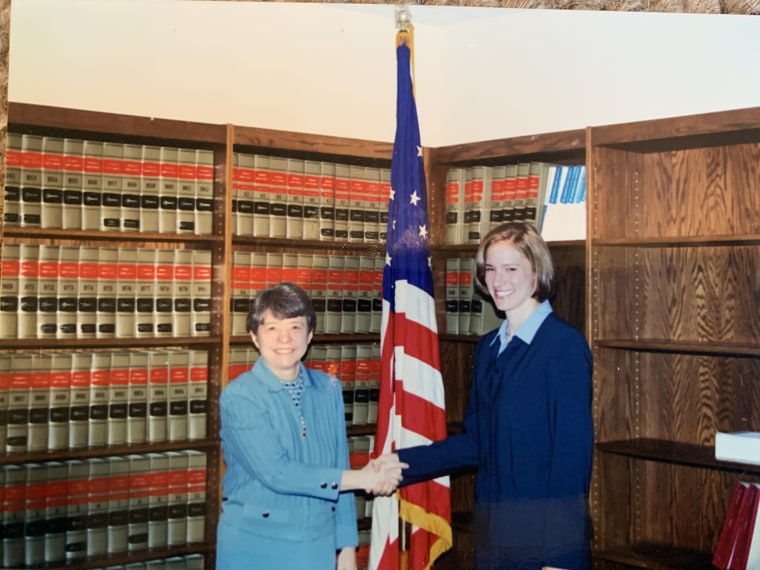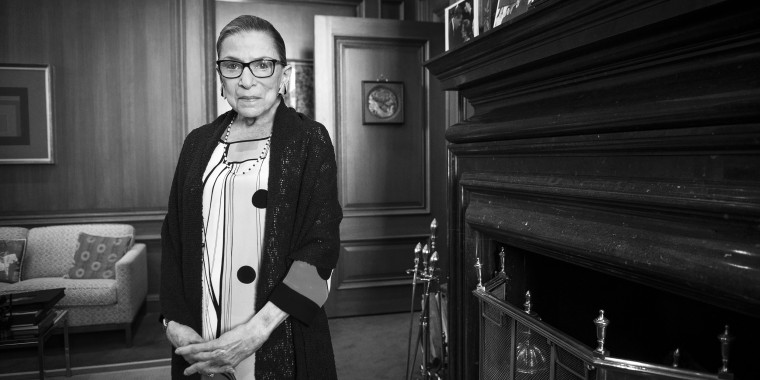I’ve spent much of the past few days with my women lawyer friends talking, mourning and comforting each other about the passing of Justice Ruth Bader Ginsburg. My friends (like women lawyers across the country) cross different legal fields and generations: they are litigators, professors, reproductive rights advocates, environmental lawyers, legal aid attorneys, immigration rights attorneys, civil rights lawyers, government lawyers, state and federal prosecutors and more.
I have been struck both by the depth of my own grief about Justice Ginsburg’s passing and how far and wide it seems to be felt across a spectrum of women, but especially women in the legal field. Of course, we knew we would be sad. We knew we would want to honor her legacy as a civil rights lawyer, a pioneer for women’s equality, as a phenomenal Justice and legendary dissenter. But most of us did not expect to feel such a gaping hole.
For many of us, even those of us who never had the honor of meeting Justice Ginsburg face to face, Justice Ginsburg’s death feels surprisingly personal. Why? Because, as we celebrate her life and the magnitude of what she accomplished for herself, and for us, we also feel the enormity of the work still before us.
Justice Ginsburg went to law school at a time when women were less than 3 percent of lawyers in the country; today we are approximately 38 percent. She was admitted to Harvard Law School in 1956, as one of only 9 women in a class of about 500 men, and the dean reportedly asked her and the other women why they were taking a man’s spot.
We’ve made progress. Today, women represent approximately 50 percent of the students graduating from law schools and, presumably, no one would (at least openly) question a woman’s right to pursue a legal career. When most of the women lawyers of today were born, there had not yet been a female Supreme Court Justice. As of today, we have had four. Thanks in no small part to Justice Ginsburg, women are now leaders in every area of the law, and women across professions are treated more equally and more fairly than ever before. As a female, Jewish lawyer, I can honestly say that I would never have had the rewarding legal career that I have had so far were it not for Justice Ginsburg. And so, first and foremost, I celebrate her life and legacy.

But, the departure of Justice Ginsburg from the legal landscape has also highlighted for me, and so many women, the fragility of our democracy and our rights, and the limitations of our accomplishments and progress as professional women and lawyers.
With her passing, we take stock of what we have accomplished - but also how far we have still to go. Less than 35 percent of federal judges, and only 22 percent of state court judges were women as of 2019. Women lawyers’ weekly salary was still only 80 percent of male lawyers in 2018 and men are still 70 percent or more of General Counsels for Fortune 500 and up corporations. Just a quarter of the House and Senate are women. And, 75 percent of elected prosecutors across the country are white men.
These statistics aren’t horrible. But they also aren’t good. And, they aren’t nearly as good as they should be on the passing of the Notorious RBG.
More importantly, these statistics don’t tell the whole story of daily, often insidious, and sometimes explicit, discrimination that women in all professions, including the law, face. Almost all women lawyers that I know have experienced some degree of harassment by a judge, colleague, adversary or supervisor. We have had our appearance commented upon at inappropriate times, our abilities underestimated because of our gender, or our opportunities limited because we were not part of the old boys’ club. In some cases, we have experienced inappropriate touching or extreme sexual harassment. And, often, we felt we could not speak out because of how it might impact our career. This is remarkable because we, the women of the legal profession, are in most cases supposed to be the empowered ones -- the ones with the resources, the skill set, the tools at our disposal, to fight this power imbalance.
So, where does this leave us? It leaves us feeling in awe of and grateful to Justice Ginsburg. She overcame even more rigid obstacles in her path and shattered glass ceilings and broke down doors in her own career and then held them up and open for the rest of us. But, it also leaves, at least this woman lawyer (and I expect legions more), feeling an even greater determination to continue her fight.
We women lawyers have been passed the baton. We must step out of our comfort zones and into rooms where we may not be welcome; we must speak up when we are mistreated, or simply when inappropriate comments are made. We must continue to bring the cases and fight the legal battles on behalf of those less fortunate and more vulnerable than us. We must mentor next generations of women in the legal field and beyond. In the words of RBG, "real change, enduring change, happens one step at a time.” We will keep stepping forward.
Mimi Rocah was a federal prosecutor in the SDNY for over 16 years, a Criminal Justice Fellow at Pace University School in White Plains and an MSNBC Legal Analyst. She is currently the Democratic Nominee for Westchester County New York District Attorney.
